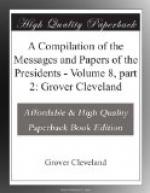By the terms of the treaty defining the rights, immunities, and privileges of consuls, between Italy and the United States, ratified in 1868, either Government may, after the lapse of ten years, terminate the existence of the treaty by giving twelve months’ notice of its intention. The Government of Italy, availing itself of this faculty, has now given the required notice, and the treaty will accordingly end on the 17th of September, 1878. It is understood, however, that the Italian Government wishes to renew it in its general scope, desiring only certain modifications in some of its articles. In this disposition I concur, and shall hope that no serious obstacles may intervene to prevent or delay the negotiation of a satisfactory treaty.
Numerous questions in regard to passports, naturalization, and exemption from military service have continued to arise in cases of emigrants from Germany who have returned to their native country. The provisions of the treaty of February 22, 1868, however, have proved to be so ample and so judicious that the legation of the United States at Berlin has been able to adjust all claims arising under it, not only without detriment to the amicable relations existing between the two Governments, but, it is believed, without injury or injustice to any duly naturalized American citizen. It is desirable that the treaty originally made with the North German Union in 1868 should now be extended so as to apply equally to all the States of the Empire of Germany.
The invitation of the Government of France to participate in the Exposition of the Products of Agriculture, Industry, and the Fine Arts to be held at Paris during the coming year was submitted for your consideration at the extra session. It is not doubted that its acceptance by the United States, and a well-selected exhibition of the products of American industry on that occasion, will tend to stimulate international commerce and emigration, as well as to promote the traditional friendship between the two countries.
A question arose some time since as to the proper meaning of the extradition articles of the treaty of 1842 between the United States and Great Britain. Both Governments, however, are now in accord in the belief that the question is not one that should be allowed to frustrate the ends of justice or to disturb the friendship between the two nations. No serious difficulty has arisen in accomplishing the extradition of criminals when necessary. It is probable that all points of disagreement will in due time be settled, and, if need be, more explicit declarations be made in a new treaty.
The Fishery Commission under Articles XVIII to XXV of the treaty of Washington has concluded its session at Halifax. The result of the deliberations of the commission, as made public by the commissioners, will be communicated to Congress.
A treaty for the protection of trade-marks has been negotiated with Great Britain, which has been submitted to the Senate for its consideration.




